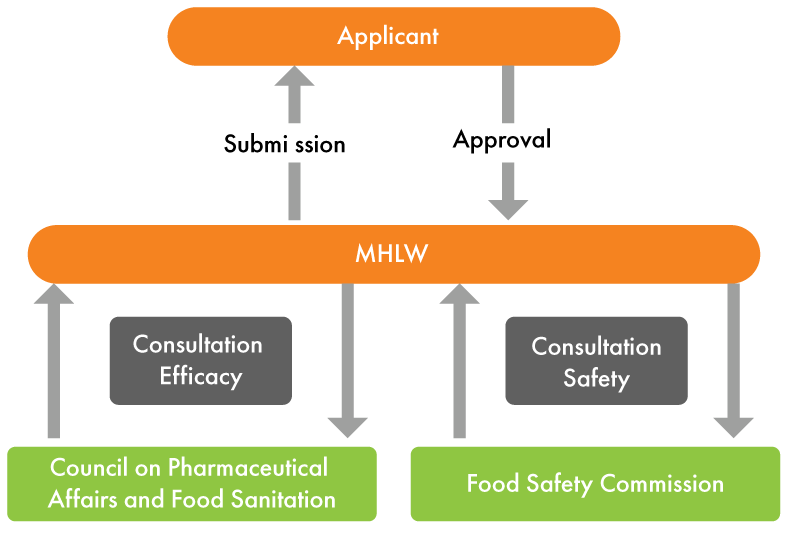Food for Specified Health Uses (FOSHU) represents a category of foods in Japan that contain specific ingredients known to have health benefits and have received official approval for making claims on their physiological effects on the human body. These foods are designed for individuals seeking to maintain or enhance their health or address specific health concerns, such as controlling blood pressure or cholesterol levels. The authorization process for a food product falling under FOSHU involves rigorous assessments to ensure the validation of claims on its safety and efficacy in terms of promoting health. In fact, the Ministry of Health, Labour, and Welfare (MHLW), Japan must officially approve these claims.
How Can You Gain Approval for FOSHU Products in Japan?
You must meet several key requirements to gain approval for FOSHU products in Japan. Such requirements include:
- Proven Efficacy: You must provide scientific evidence that clearly demonstrates the food product’s positive effects on the human body.
- Safety Assurance: The food product must undergo comprehensive safety evaluations, including animal toxicity tests and assessments of potential adverse effects that may be caused by excessive consumption.
- Balanced Nutrition: FOSHU products should contain ingredients that are nutritionally beneficial, avoiding excessive use of substances like salt.
- Quality Control: You must establish and adhere to robust quality control methods and product specifications, including ingredients, processes, and analytical methods, throughout the production process.
Flow Chart Depicting the FOSHU Approval Process

The FOSHU approval process in Japan involves a set of comprehensive assessments and rigorous scrutiny of each stage to ensure that these specialized foods deliver safe and effective health benefits. Freyr, with its team of Regulatory experts, assists food and supplement manufacturers in obtaining FOSHU approval and achieving a smooth entry into the Japanese market.
List of Approved FOSHU Products in Japan
| Specified Health Uses | Principal Ingredients (Ingredients Exhibiting Health Functions) |
| Foods to modify gastrointestinal conditions | Oligosaccharides, lactose, bifidobacteria, lactic acid bacteria, dietary fiber eight (08) ingestible dextrin, polydextrol, guar gum, psyllium seed coat, etc. |
| Foods related to blood cholesterol levels | Chitosan, soybean protein, degraded sodium alginate, etc. |
| Foods related to blood sugar levels | Indigestible dextrin, wheat albumin, guava tea polyphenol, L-arabiose, etc. |
| Foods related to blood pressure | Lactotripeptide, casein dodecaneptide, tochu leaf glycoside (geniposidic acid), sardine peptide, etc. |
| Foods related to dental hygiene | Paratinose, maltitiose, erythrytol, etc. |
| Cholesterol plus gastrointestinal conditions, triacylglycerol plus cholesterol | Degraded sodium alginate, dietary fiber from psyllium seed husk, etc. |
| Foods related to mineral absorption | Calcium citrated malate, casein phosphopeptide, hem iron, fracuto-oligosaccharide, etc. |
| Foods related to osteogenesis | Soybean isoflavone, Milk Basic Protein (MBP), etc. |
| Foods related to triacylglycerol | Medium Fatty Acids (MCFA), etc. |
Variations of FOSHU Products
In addition to conventional FOSHU products, there are variations to accommodate different scenarios, which are as follows:
- Qualified FOSHU: This category includes food products that carry potential health benefits that do not meet the rigorous scientific criteria of FOSHU yet but, at the same time, demonstrate a certain level of efficacy, even without a fully established mechanism.
- Standardized FOSHU: These are food products that conform to established standards and specifications derived from accumulated scientific evidence and previous FOSHU approvals.
- Reduction of Disease Risk FOSHU: Food products falling under this category make claims related to the reduction of disease risk, and there is both clinical and nutritional evidence supporting the ingredients’ efficacy.
Examples of Approved Claims
Here are some key examples of approved FOSHU claims:
- Calcium and Osteoporosis: Consuming an adequate amount of calcium as part of a healthy diet, combined with appropriate exercise, may promote healthy bone development in young women and reduce the risk of osteoporosis as they age.
- Folic Acid and Neural Tube Defects: Consuming a proper amount of folic acid as part of a balanced diet may help women have healthy babies by reducing the risk of neural tube defects during foetal development.
For further assistance, contact Freyr at sales@freyrsolutions.com.